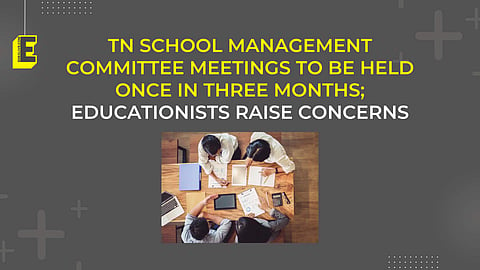

The recent assurance given by the school education department to reduce the number of school management committee meetings has left the educationalists worried.
The school management committees, which consist of parents, teachers and elected representatives, were reconstituted in Tamil Nadu in April 2021 across more than 30,000 government schools in the state to ensure community participation in the functioning of the schools as mandated under the Right to Education Act. Teachers' associations said it is difficult for headmasters to ensure that parents participate in the meeting on a monthly basis, as stated in a report by The New Indian Express.
The Right to Education (RTE) Act stipulates that 75% of the committee members should be parents and it should preferably be led by a woman. The move by the school education department to reconstitute the dysfunctional bodies was widely welcomed by educationalists, although they recommend some fine-tuning to spread more awareness. However, the initiative is currently facing resistance from teachers' associations.
Tamil Nadu Elementary Teachers Organisations Joint Action Committee (TETO JAC) had urged the education department to reduce the frequency of SMC meetings as one of their 30 demands during the talks held with the school education officials and minister last week. This demand was accepted and the department assured them that meetings would now be held once every three months instead of every month.
Following this, many educationists have raised concerns that monthly meetings are mandated under the RTE Act. They argue that the reduction in the number of meetings deprives the community of its participation in children's education.
The department's decision to accommodate the associations' demands can be attributed to conflicts between headmasters and SMC members in a few schools and difficulties cited by the headmasters in ensuring parents' attendance at the meetings. Block Resource Teacher Educators (BRTEs) note that headmasters and teachers sometimes clash with overseers when the latter tries to teach SMC members about their roles and responsibilities.
However, teacher associations argue that parents in many schools, particularly those in rural areas, are hesitant to attend monthly meetings as many of them are daily wage labourers. "Convincing them to attend these meetings is challenging. It is an additional pressure on teachers and they have to visit parents at their homes or workplaces to ensure their participation in the meetings," said the head of an association affiliated with TETO JAC.
Su Moorthy, coordinator of Kalvi Membattu Kootamaippu and a government school teacher, said until now, the administrative authority is fully rested with headmasters, as stated in a report by The New Indian Express.
Thenkanal of Palli Kalvi Iyakkam said those with a democratic approach accept the involvement of parents, while others may be less receptive to parents asking questions. "Despite these problems, we have to move towards transparency and address these issues in a fair manner," he said, stressing the need to provide training to both parents and teachers regarding the functioning of the committee.
